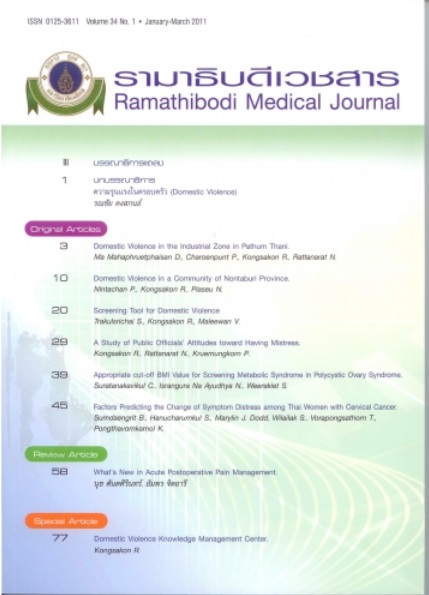A Study of Public Officials' Attitudes toward Having Mistress
Main Article Content
Abstract
Objectives: The study purposes were to survey the public officials’ attitudes and to find ways to prevent having mistress problem.
Methods: The study method was the survey research collecting information through questionnaires from the public officials 1,573 persons (total 1,750 persons).
Results: The study result found that there were females (56.2%) and males (43.8%). Most of them is 31-45 year old (42.7%); were marriage (54.4%); graduated with a Bachelor Degree (50.2%); had salary 8,001-15,000 Bath per month (32.9%) Most males had opinions that opportunity, situation, intimacy or sympathy was reasons to have the mistress without intention (58.2%), while most females had opinions that the reason of having mistress was insufficiency of males (77.8%). Most males had opinions on having or being mistress that were deemed personal matter (59.4%), while most females had opinions on having or being mistress that were immoral (49.5%). Most males had opinions on having mistress that the husband should end his marriage life with current wife before had a new wife (83.0%), which agreed with most females’ opinions on having or being mistress that the husband should end his marriage life with current wife before had a new wife (97.2%).
Conclusion: The study can be concluded that having mistress is a problem that the social must be aware because it is a part of occurrence of violation in the family or family breaking. For males’ opinion on having mistress to be deemed personal matter or cheating when he had a chance, the findings suggest that we should find the ways to change their attitudes to be the monogamy idea, to make them think about its consequences such as in reputation, career or organization, and to apply regulations and directives of Civil Services system to control their behaviors.
Article Details
References
Aekplakorn W, Kongsakon R. Intimate partner violence among women in slum communities in Bangkok, Thailand. Singapore Med J. 2007;48(8):763-8.
Archavanitkul K, Kanchanachitra C, Im-Em V, Lerdsrisantad, U. Domestic Violence and Woman's Health. Nakhon Pathom: Institute for Population and Social Research, Mahidol University; 2003.
Limsuwan L, Kongsakon R. Causes of Having Mistresses in 20 Thai Men. J Psychiatr Assoc Thailand. 1998;43(3):207-16.
Kongsakon R, Pocham N. Domestic Violence. Bangkok: Sahaprchapanich; 2008.
Kongsakon R, Pocham N. Alcohol abuse and domestic violence in Thailand: matching case-control study. J Psychiatr Assoc Thailand. 2007;52(3):296-205.
Hutabaedya B, Suwannarat K. Impact of Alcohol Consumption as a Factor Domestic Violence. Bangkok. Friends of Women Foundation; 2003:2.
Office of the Civil Service Commission (OCSC). Civil Service Act, B.E. 2551 (2008). Available from: https://www.ocsc.go.th/sites/default/files/attachment/law/act_law2551.pdf.
Kongsakon R. Bangkok: Sahaprchapanich; 2004. Available from: https://203.154.45.233/system/files/documents/100_ry_eruuengrakrunaerng.pdf.
Is one wife enough? Polygamy's increasingly threatened role in the modern world. Asiaweek. 1993:28-30, 35.
Braithwaite T. Children who are abused. Ment Health Today. 2009:19.
Kongsakon R. Forensic Psychiatry. Bangkok: Banhkok Block Ltd; 2006. Available from: https://doc2.clib.psu.ac.th/public10/283718.pdf.
